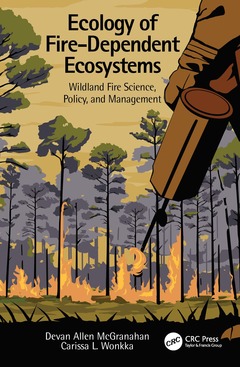Description
Ecology of Fire-Dependent Ecosystems
Wildland Fire Science, Policy, and Management
Authors: McGranahan Devan Allen, Wonkka Carissa L.
Language: English
Keywords
Fire Dependent Ecosystems; Fire ecology; Fireline Intensity; fire science; Wildland Fire; Anthropocene; Fire Prone Landscapes; Ecology of Fire-Dependent Ecosystems; Prairie Chickens; Forest Ecology and Management; Moisture Content; combustion; Fire Regime; fire behaviour; Fire Return Interval; Fire Suppression Policies; wildland fire management; Low Severity Burns; fire management policy; Longleaf Pine Ecosystem; fire effects; Fire Management Policies; Forest Fire Act; Wildland Fuels; Fire Stick Farming; WUI; Burned Area; Unburned Areas; Fire Prone Ecosystems; Soil Water Repellency; Live Fuel Moisture Content; Mediterranean Type Ecosystems; Fuel Particles; Pyrogenic Carbon
250.90 €
In Print (Delivery period: 14 days).
Add to cartPublication date: 12-2020
· 21x28 cm · Hardback
89.57 €
In Print (Delivery period: 14 days).
Add to cartPublication date: 12-2020
· 21x28 cm · Paperback
Description
/li>Contents
/li>Biography
/li>
Ecology of Fire-Dependent Ecosystems is brimming with intriguing ecological stories of how life has evolved with and diversified within the varied fire regimes that are experienced on earth. Moreover, the book places itself as a communication between students, fire scientists, and fire fighters, and each of these groups will find some familiar ground, and some challenging aspects in this text: something which ultimately will help to bring us closer together and enrich our different approaches to understanding and managing our changing planet.
-- Sally Archibald, Professor, University of the Witwatersrand, Johannesburg, South Africa
Most textbooks are as dry as kindling and about as much fun to sink your teeth into. This is not that kind of textbook. Devan Allen McGranahan and Carissa L. Wonkka have taken a complex topic and somehow managed to synthesize it into a comprehensive, yet digestible form. This is a book you can read cover to cover ? I know, I did it. As a result, I took an enlightening journey through the history and fundamentals of fire and its role in the natural and human world, ending with a thoughtful review of the evolving relationship between humans and wildland fire.
-- Chris Helzer, Nebraska Director of Science, The Nature Conservancy, and author of The Prairie Ecologist blog
Ecology of Fire-Dependent Ecosystems: Wildland Fire Science, Policy, and Management is intended for use in upper-level courses in fire ecology and wildland fire management and as a reference for researchers, managers, and other professionals involved with wildland fire science, practice, and policy. The book helps guide students and scientists to design and conduct robust wildland fire research projects and critically interpret and apply fire science in any management, education, or policy situation. It emphasizes variability in wildland fire as an ecological regime and provides tools for students, researchers, and managers to assess and connect fire environment and fire behaviour to fire effects.
Fire has not only shaped social and ecological communities but pushed ecosystems beyond previous boundaries, yet understanding the nature and effects of fire as an ecological disturbance has been slow, hampered by the complexity of the dynamic interactions between vegetation and climate and the fear of the destruction fire can bring. This book will help those who study, manage, and use wildland fire to develop new answers and novel solutions, based on an understanding of how fire functions in natural and social environments. It reviews literature, synthesizes concepts, and identifies research gaps and policy needs. The text also explores the interaction of fire and human culture, demonstrating how fire policy can be made adaptable to cultural and socio-ecological objectives.
Introduction. From flame to flame front. Part 1 Fire Fundamentals. Wildland fire regimes: Past and present.Wildland fire regimes: The role of humans. Part 2 Fire Effects. Fundamentals of wildand fire impacts & ecology. Soil properties. Water and the atmosphere. Individuals & populations. Pyrodiversity. Part 3 Human Dimensions. Cultural connections to fire. Institutional management & policy. Coexisting with wildland fire. References cited. Index
Devan Allen McGranahan grew up on his family’s farm in Clay County, Iowa. After graduating from Grinnell College with a BA in Biology, he spent a year in Southern Africa conducting independent research on rangeland management and biodiversity conservation supported by the Thomas J. Watson Foundation. He studied patch-burn grazing at Iowa State University, earning a MS in Sustainable Agriculture and a PhD in Ecology & Evolutionary Biology. After a post-doctoral fellowship at The University of the South in Sewanee,Tennessee, he spent nine months in the Department of Grassland Science at the University of KwaZulu-Natal,South Africa, supported by a Fulbright Faculty Teaching/Research Award and an International Innovation Postdoctoral Fellowship from the National Research Foundation of South Africa. While writing this book, he was an Assistant Professor of Range Science in the School for Natural Resource Sciences at North Dakota State University in Fargo, North Dakota.
Carissa Lyn Wonkka grew up in western Massachusetts and graduated from the University of Massachusetts, Amherst, in 2003 with a BS in Wildlife Conservation & Management. She earned a JD from Suffolk University Law School in 2008, then received her MS in Rangeland Ecology & Management and PhD in Ecosystem Science & Management from Texas A&M. She worked for four years as a post-doctoral research associate at University of Nebraska–Lincoln, before taking a position as Research Ecologist at the USDA ARS Northern Plains Agricultural Research Laboratory in Sidney, Montana.




